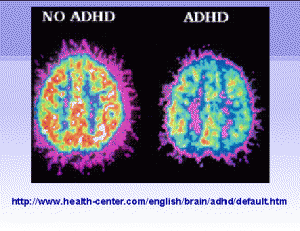Have you ever been having a conversation with a friend or your child (or your husband!) and one thing you say sends them on a COMPLETE tangent? What are the words often muttered or thought…something to the effect of “Hello ADD…FOCUS!” Well, recently, my brother–15 years old–was diagnosed with ADD and it made me rethink my quick and potentially insulting tongue and do some research on the subject that I thought was worth sharing with you all.
ADD, attention-deficit disorder, is defined as a problem with inattentiveness, over-activity, impulsivity, or a combination. Sounds like everyone you know, right? Welll…wrong. Unlike the typical inattentive behavior or impulsive nature you or I might struggle with, someone struggling with ADD or ADHD is incapable of controlling their behavior.
 According to the CDC, 5.4 million children ages 4 to 17 in the United States suffer from AD(H)D. That equals approximately 9.5% of children that have been diagnosed since 2007.
According to the CDC, 5.4 million children ages 4 to 17 in the United States suffer from AD(H)D. That equals approximately 9.5% of children that have been diagnosed since 2007.
AD(H)D is a growing concerns amongst parents and it continues as we grow into adults and show what we think are signs, so I thought it might be helpful to provide you all with a list of things to be on the lookout for and if you should see any of the signs, it may be worth a quick call to your pediatrician about the options that would be best for your child and your family. My mother opted to use prescription medication with my brother. In the time he has been medicated (that sounds terrible, I know) he has shown vast improvements in his ability to focus and additionally has a much calmer and rational attitude. My mother has mentioned in passing that she can tell when his medicine is wearing off because his 15-year-old-punk side starts showing.
Any who, where is the list of symptoms for your consideration from the CDC web site.
Six or more of the following symptoms of inattention have been present for at least 6 months to a point that is inappropriate for developmental level:
Inattention
- Often does not give close attention to details or makes careless mistakes in schoolwork, work, or other activities.
- Often has trouble keeping attention on tasks or play activities.
- Often does not seem to listen when spoken to directly.
- Often does not follow through on instructions and fails to finish schoolwork, chores, or duties in the workplace (not due to oppositional behavior or failure to understand instructions).
- Often has trouble organizing activities.
- Often avoids, dislikes, or doesn’t want to do things that take a lot of mental effort for a long period of time (such as schoolwork or homework).
- Often loses things needed for tasks and activities (e.g. toys, school assignments, pencils, books, or tools).
- Is often easily distracted.Is often forgetful in daily activities.
Six or more of the following symptoms of hyperactivity-impulsivity have been present for at least 6 months to an extent that is disruptive and inappropriate for developmental level:
Hyperactivity
- Often fidgets with hands or feet or squirms in seat when sitting still is expected.
- Often gets up from seat when remaining in seat is expected.
- Often excessively runs about or climbs when and where it is not appropriate (adolescents or adults may feel very restless).
- Often has trouble playing or doing leisure activities quietly.
- Is often “on the go” or often acts as if “driven by a motor”.
- Often talks excessively.
Impulsivity
- Often blurts out answers before questions have been finished.
- Often has trouble waiting one’s turn.
- Often interrupts or intrudes on others (e.g., butts into conversations or games).
II. Some symptoms that cause impairment were present before age 7 years.
III. Some impairment from the symptoms is present in two or more settings (e.g. at school/work and at home).
IV. There must be clear evidence of clinically significant impairment in social, school, or work functioning.
V. The symptoms do not happen only during the course of a Pervasive Developmental Disorder, Schizophrenia, or other Psychotic Disorder. The symptoms are not better accounted for by another mental disorder (e.g. Mood Disorder, Anxiety Disorder, Dissociative Disorder, or a Personality Disorder).
I hope this doesn’t freak you out! AD(H)D is very common and more importantly, manageable. Do you have any experience with AD(H)D or what about someone in your circle? How do you or your friends work through it?










